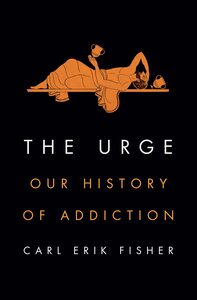Take a photo of a barcode or cover
challenging
dark
informative
tense
medium-paced
informative
reflective
medium-paced
challenging
dark
emotional
hopeful
informative
sad
medium-paced
dark
informative
reflective
slow-paced
Moderate: Addiction, Alcoholism, Drug abuse, Drug use, Mental illness, Misogyny, Medical content, Alcohol
challenging
emotional
informative
reflective
medium-paced
An eye-opening exploration of the socio-medical history of addiction and how multi-factorial recovery from addiction can be.
This book is about addiction, so can be triggering for people in recovery or people who’ve lost loved ones to addiction.
It was an interesting historical timeline to what we thought about and how we handled addiction. Some parts of the book were a bit watery, I felt that sometimes a chapter couldn’t hold itself up on its own and could’ve been condensed down.
What I also like about this book was the author’s story and alignment with his own struggles with alcoholism. Overall a very good read for alcohol addiction, but it’s very narrow in that case.
What I also like about this book was the author’s story and alignment with his own struggles with alcoholism. Overall a very good read for alcohol addiction, but it’s very narrow in that case.
Part 4, Addiction on Trial, was (in my opinion) the best section and contained the pages that I was looking for when I initially picked up this book.
Dr. Fisher speaks from personal experience as a patient of an imperfect and historically flawed system and a physician - a cog in that very machine. I'm not a history buff, so I did find myself skimming through the jist of parts, but background is vital to understand the current environment. What this book does that is important is give a context to addiction care and perception in the US throughout circa the past century. It offers a compassionate view in understanding addiction, schools of thought, the harms of "war" rhetoric, and diversity in recovery care. Dr. Fisher recognizes women who have been essential leaders in addiction treatment as we know it, and does not shy away from recognizing his own privilege in historically racist systems. This book leaves one imagining better models of addiction treatment. It makes one wonder, with more holistic accessible treatment in communities, perhaps what a better world it could be for us all.
Dr. Fisher speaks from personal experience as a patient of an imperfect and historically flawed system and a physician - a cog in that very machine. I'm not a history buff, so I did find myself skimming through the jist of parts, but background is vital to understand the current environment. What this book does that is important is give a context to addiction care and perception in the US throughout circa the past century. It offers a compassionate view in understanding addiction, schools of thought, the harms of "war" rhetoric, and diversity in recovery care. Dr. Fisher recognizes women who have been essential leaders in addiction treatment as we know it, and does not shy away from recognizing his own privilege in historically racist systems. This book leaves one imagining better models of addiction treatment. It makes one wonder, with more holistic accessible treatment in communities, perhaps what a better world it could be for us all.
informative
medium-paced
informative
medium-paced
slow-paced
Too much memoir to be a solid history, too much history to be a meaningful memoir. I think the author did a good job explaining the complexity of addiction and attitudes about it through time, but it was a more limited history than I was expecting.



